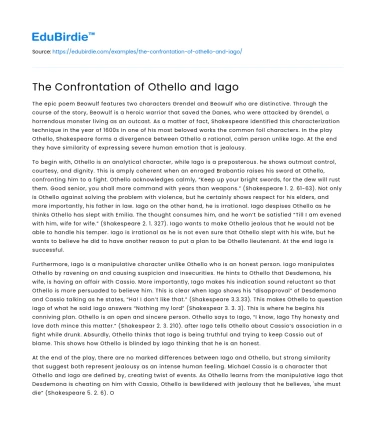The epic poem Beowulf features two characters Grendel and Beowulf who are distinctive. Through the course of the story, Beowulf is a heroic warrior that saved the Danes, who were attacked by Grendel, a horrendous monster living as an outcast. As a matter of fact, Shakespeare identified this characterization technique in the year of 1600s in one of his most beloved works the common foil characters. In the play Othello, Shakespeare forms a divergence between Othello a rational, calm person unlike Iago. At the end they have similarity of expressing severe human emotion that is jealousy.
To begin with, Othello is an analytical character, while Iago is a preposterous. he shows outmost control, courtesy, and dignity. This is amply coherent when an enraged Brabantio raises his sword at Othello, confronting him to a fight. Othello acknowledges calmly, “Keep up your bright swords, for the dew will rust them. Good senior, you shall more command with years than weapons.” (Shakespeare 1. 2. 61-63). Not only is Othello against solving the problem with violence, but he certainly shows respect for his elders, and more importantly, his father in law. Iago on the other hand, he is irrational. Iago despises Othello as he thinks Othello has slept with Emilia. The thought consumes him, and he won’t be satisfied “Till I am evened with him, wife for wife.” (Shakespeare 2. 1. 327). Iago wants to make Othello jealous that he would not be able to handle his temper. Iago is irrational as he is not even sure that Othello slept with his wife, but he wants to believe he did to have another reason to put a plan to be Othello lieutenant. At the end Iago is successful.
Save your time!
We can take care of your essay
- Proper editing and formatting
- Free revision, title page, and bibliography
- Flexible prices and money-back guarantee
Furthermore, Iago is a manipulative character unlike Othello who is an honest person. Iago manipulates Othello by ravening on and causing suspicion and insecurities. He hints to Othello that Desdemona, his wife, is having an affair with Cassio. More importantly, Iago makes his indication sound reluctant so that Othello is more persuaded to believe him. This is clear when Iago shows his “disapproval” of Desdemona and Cassio talking as he states, “Ha! I don’t like that.” (Shakespeare 3.3.33). This makes Othello to question Iago of what he said Iago answers “Nothing my lord” (Shakespear 3. 3. 3). This is where he begins his conniving plan. Othello is an open and sincere person. Othello says to Iago, “I know, Iago Thy honesty and love doth mince this matter.” (Shakespear 2. 3. 210). after Iago tells Othello about Cassio’s association in a fight while drunk. Absurdly, Othello thinks that Iago is being truthful and trying to keep Cassio out of blame. This shows how Othello is blinded by Iago thinking that he is an honest.
At the end of the play, there are no marked differences between Iago and Othello, but strong similarity that suggest both represent jealousy as an intense human feeling. Michael Cassio is a character that Othello and Iago are defined by, creating twist of events. As Othello learns from the manipulative Iago that Desdemona is cheating on him with Cassio, Othello is bewildered with jealousy that he believes, 'she must die” (Shakespeare 5. 2. 6). Othello allows his affection and possessiveness of Desdemona to take over him until he ultimately would rather kill her than allow any other man to have her. Iago is jealous due to Othello giving Cassio the position of being lieutenant. Iago’s jealousy is shown when he states, “I know my price, I am worth no worse a place” (Shakespeare 1. 1. 13). His jealousy is driven by ambition for revenge to a point where he creates a plan and put it to action to get what he desires, being lieutenant. As the story comes to an end the two-foil character share similar emotion.
All in all, throughout the play, Shakespeare illustrates character foil in literature. In Othello, the antagonist Iago share a similarity with the protagonist Othello the emotion of jealousy, but many differences in their rationality and honesty. This is same as Harry Potter and Lord Voldemort being foil in their persona as good and evil.






 Stuck on your essay?
Stuck on your essay?

